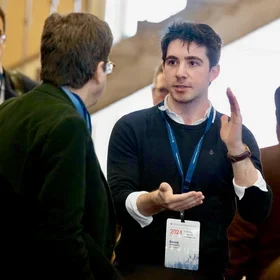Although she was born and raised in Santiago, Chile, Brenda Rain Garrido’s ancestry can be traced back to the southern Chilean region of Araucanía, with ties to the indigenous Mapuche people and their culture. This background has become central to Rain’s holistic approach to sustainable living.
As one of the first two Luksic Scholars in the Columbia School of Professional Studies M.S. in Sustainability Management (SUMA) program, Rain is eager to combine her academic and professional background in economics with the program’s interdisciplinary training, boasting top-tier sustainability academics, researchers, and practitioners in the field.
“I have an innate interest in sustainability, which comes from my biological roots, so to speak,” explains Rain. “The conceptualization of what is sustainable or not is qualitative, anthropological, and historical, but it’s not always applied to concrete initiatives that are being carried out in today’s world.”
We recently spoke with Rain about the challenge in bridging her ancestral perspective with modern economic realities, and how this, informed by the SUMA program, might provide unique insight into modern sustainability issues.
Why is sustainability important to you?
Because of where I come from. My grandparents on my father’s side are from the south of Chile and are of Mapuche origin. When I was a child, I didn’t have a deep connection with this part of my heritage, but as I grew up and reflected on what it means to be indigenous in Chile, I developed a unique perspective on the importance of sustainability in today’s modern world. In their culture, the Mapuche people demand a balanced lifestyle. They believe that as humans, we must live in harmony with nature and with each other, and that is something that appeals to me deeply.
How do you see your economics background contributing to your studies in Sustainability Management at Columbia?
One of the most-used phrases in economics is “depends on.” Therefore, I believe that my previous studies in economics at the University of Chile will help me contribute to my studies in sustainability from an analytical and critical thinking perspective.
What sustainability work have you already completed?
In my most recent work experience at the Corporación de Fomento de la Producción de Chile (CORFO), I was in charge of the business intelligence area in research, development, and innovation [R&D&I]. Sustainable economic development has been emphasized in Chile for some years, and this is where my path—business intelligence and economics—meets sustainability. I started to develop and measure all kinds of metrics in innovation and research projects that could characterize what the government, specifically CORFO, has done in relation to progressing sustainability.
What inspired you to start working on climate-change-related issues?
While working at CORFO, I took on innovation issues, which highlighted the challenges faced by R&D&I in Chile, particularly in accessing sufficient financing for sustainability initiatives. The critical point about why it is difficult to finance R&D&I projects is because they face traditional market failures like information asymmetry, difficulties in collaboration, and uncertainty. Despite some development in the capital market, gaps remain, especially in demonstrating the sustainability and attractiveness of R&D&I projects. Few companies focus on sustainable metrics. While initiatives like Start-Up Chile have garnered international attention, local venture capital remains underdeveloped, and despite government efforts to boost private investments in fintech, biotech, and renewable energy, Chile still struggles to match the scale needed to support R&D&I growth.
Why did you want to join the Sustainability Management graduate program at Columbia?
Well, besides it being Columbia, which is self-explanatory, I took the time to research the curricula of several programs, and this was the only one where I said, “This is it.” The flexibility of the curriculum is incredible. It allows me to focus on the areas I want while exploring others. This is something you don’t tend to see in other programs.
What do you hope to do with your degree?
I would love to work abroad for a while. I think this master’s degree will allow me to pursue an international career, either here in the United States or in another country. International experience will provide me with valuable knowledge and open-mindedness to apply what is happening in developed countries back in Chile.
What are you looking forward to most about residing in New York City?
I’m not sure where to start. I’ve never lived outside of my country, so being abroad is already a jump from zero to 100, and being in New York is a jump from zero to 1,000. The city offers incredible academic, networking, and cultural opportunities. I feel like my mind is always racing to what’s next, and New York moves at the same pace, so that is already incredibly exciting.
About the Program
The Columbia University M.S. in Sustainability Management program offered by the School of Professional Studies in partnership with the Climate School provides students cutting-edge policy and management tools they can use to help public and private organizations and governments address environmental impacts and risks, pollution control, and remediation to achieve sustainability. The program is customized for working professionals and is offered as both a full- and a part-time course of study.
About the Luksic Scholarship for Sustainability at Columbia University
Columbia University School of Professional Studies is proud to announce the Luksic Scholarship for Sustainability at Columbia University for students in the Master of Science in Sustainability Management (SUMA) program. The scholarship, supported by the Luksic Foundation, will cover the full cost of attendance, including tuition and living expenses. Students who have lived or worked in Chile and who are committed to working on sustainability efforts in the region will be eligible for the scholarship.
Application for fall 2025 enrollment is open. The deadline for international applicants is March 15, 2025. Further information regarding application requirements can be found here.


